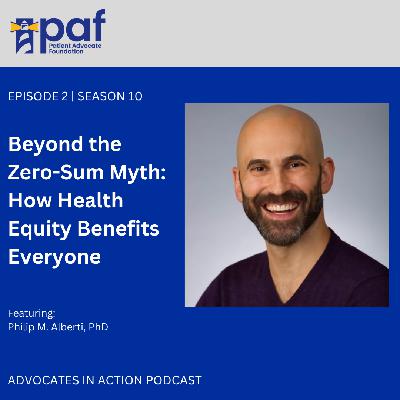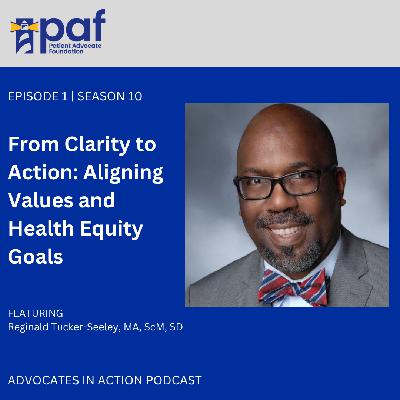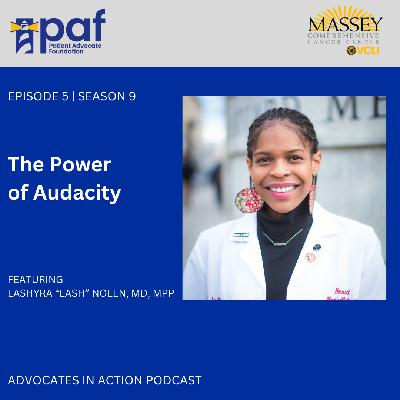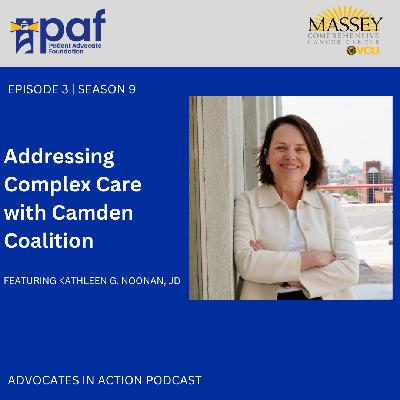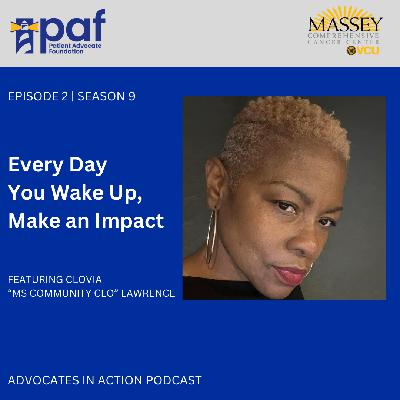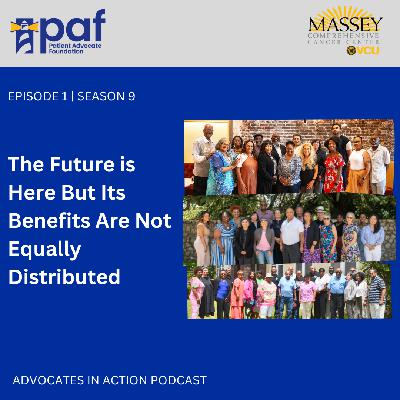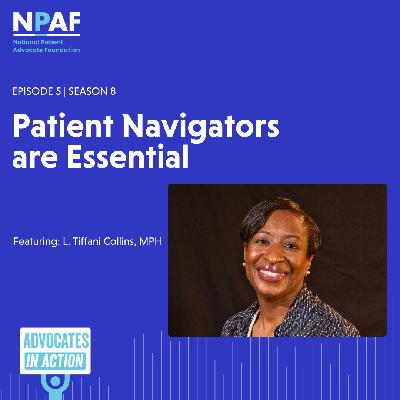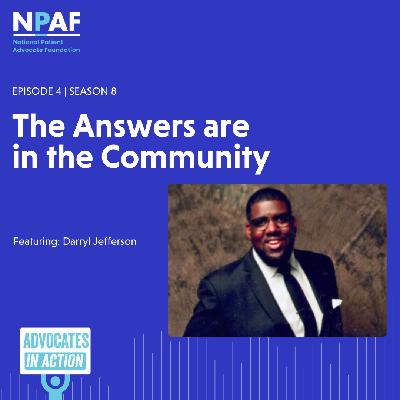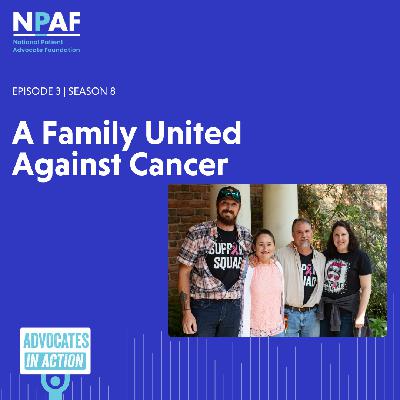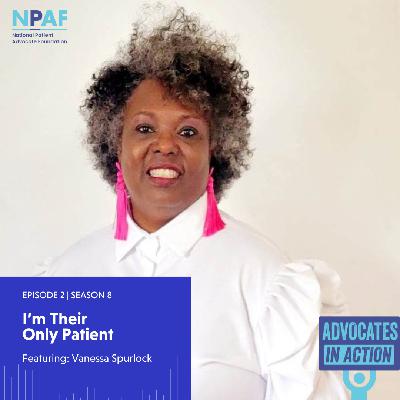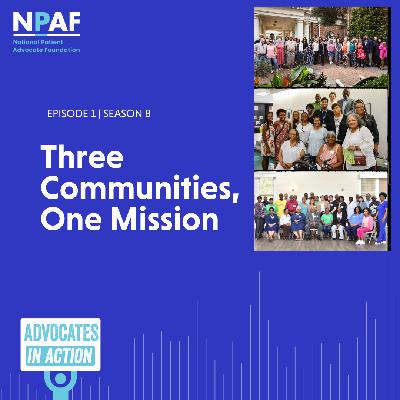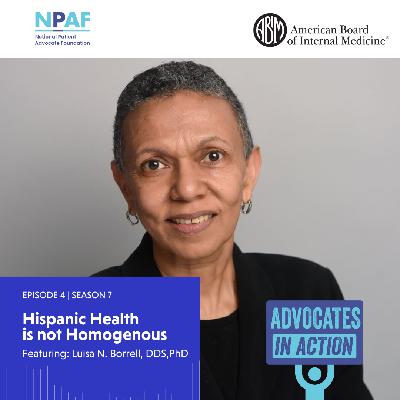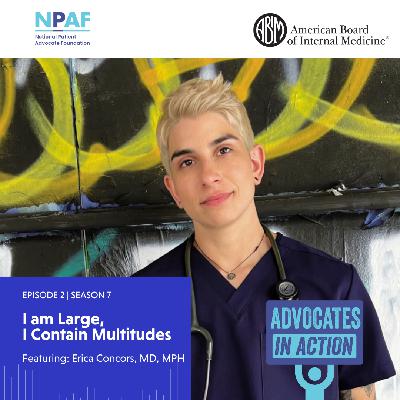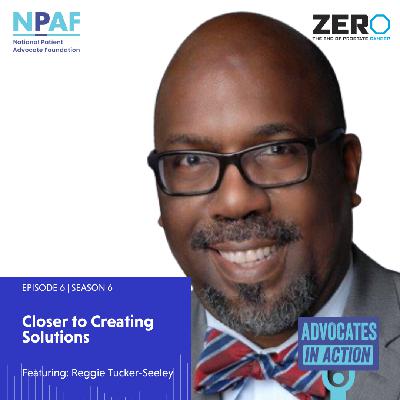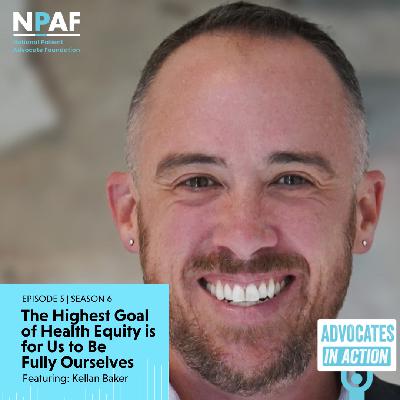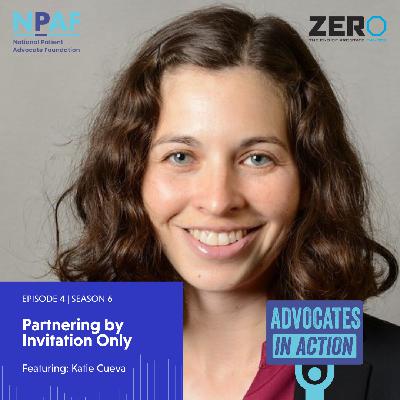Discover Advocates in Action
Advocates in Action

Advocates in Action
Author: Patient Advocate Foundation
Subscribed: 4Played: 16Subscribe
Share
© 2020 Patient Advocate Foundation
Description
Have you ever felt intimidated, confused, or overwhelmed when trying to navigate the health care system? In those moments it can be hard to advocate for yourself and those you care about. Join our host Ashley Danyel Freeman as she speaks with patients, providers and caregivers who have found the strength to advocate for equitable access to affordable quality health care. Advocates in Action is created by the Patient Advocate Foundation, a non-profit with the objective of prioritizing the patient voice to achieve person-centered care. We are dedicated to amplifying the powerful stories of individuals and the collective needs of various communities across the country.
51 Episodes
Reverse
Dr. Philip M. Alberti joins host Ashley D. Freeman to explore how we can “hold the line” and defend equity in healthcare—while challenging the false narrative that some communities must lose for others to thrive. Drawing from his recent Milbank Quarterly article “Health Equity Benefits All Communities—Including White Ones,” Dr. Alberti unpacks how language, measurement, storytelling, and belonging can help reframe health equity as a universal good. He shares practical ways to bridge divides, build cross-racial coalitions, and strengthen our collective “civic muscle” to drive long-term change from the ground up. With honesty, insight, and hope, Dr. Alberti reminds us that health equity is not a zero-sum game—it’s about creating fair and just opportunities for everyone, and it begins with listening, empathy, and local action. This episode will leave you inspired to see yourself as part of the movement for health justice.
Ever wonder why “equity” can mean so many different things—and why getting it right matters so much? In this episode, we dive into the power of defining equity clearly and why the words we use shape real-world solutions in health and social systems. Listen as Reginald Tucker-Seeley breaks down how organizations can align their values with actions, build consensus, and use storytelling to bring data and disparities to life in ways everyone can understand. We also explore the challenges we still face, from deeply rooted systemic disparities to limited funding, and why making lasting change takes both patience and persistence. Whether you’re new to health equity or have been working in the space for years, this conversation offers practical insights and inspiring reminders of how clarity, reflection, and intention can move us closer to fairness for all.
Learn more about Health Equity Strategies & Solutions
What happens when passion meets purpose in the face of injustice?
When the COVID-19 pandemic exposed deep cracks in our healthcare system, Dr. LaShyra “Lash” Nolen didn’t wait for someone else to fix them—she stepped up. As vaccine rollouts began, she saw firsthand how the needs of marginalized communities were being ignored. In response, she launched the We Got Us Project—a revolutionary health justice initiative designed to bridge the divide between medicine and the people it serves.
In this powerful episode, Dr. Nolen shares the origin story of We Got Us, a grassroots coalition committed to combating racism in our communities through increasing access to equitable healthcare, community-centered health education, and direct healing. Listen to hear how the power of audacity—passed down from her mother and grandmother has fueled every step of her journey. Tune in to hear how one woman’s determination is transforming communities, rebuilding trust, and changing the face of public health.
This season is brought to you as a collaboration between Patient Advocate Foundation and Massey Comprehensive Cancer Center at Virginia Commonwealth University, a project made possible in part by support from the Danaher Foundation.
Check Out the We Got Us Project.
What turns someone into a passionate healthcare advocate? For many, it’s personal experience—facing their own health struggles, losing a loved one, or confronting glaring health inequities. After the heart-wrenching loss of her husband, Chadwick Boseman, Simone Ledward-Boseman became a fierce advocate for health awareness. As a caregiver to Chadwick during his battle with colorectal cancer, Simone not only gained invaluable insights into patient care but also learned the importance of being proactive with health and navigating the healthcare system.
In this powerful conversation, Simone reflects on her journey—how Chadwick’s resilience inspired her and how, through caregiving, she discovered her own strength. Her mission now? To empower others to take charge of their health and advocate for themselves with the same courage and determination she learned along the way.
This season is made possible through a collaboration between the Patient Advocate Foundation and Massey Comprehensive Cancer Center at Virginia Commonwealth University, with generous support from the Danaher Foundation.
Check Out the Chadwick Boseman Foundation for the Arts.
Redefining Care: Kathleen Noonan on Transforming Health Systems
In the U.S., our healthcare system often treats problems in isolation—healthcare, housing, education, and more are handled separately, leaving many with complex needs without coordinated care. But what if there was a way to break down these silos? Complex care aims to change that by improving health and well-being for people with multiple needs, reshaping how care is delivered at every level—from individual to community to system-wide.
Join Kathleen Noonan, JD, President & CEO of the Camden Coalition, as she reveals how the organization is pioneering a multidisciplinary, community-based approach to care. Hear about the power of community partnerships, how they’ve built a model that fosters trust and collaboration, and the essential ingredients for forming meaningful, lasting relationships that transform care.
This season is made possible through a collaboration between the Patient Advocate Foundation and Massey Comprehensive Cancer Center at Virginia Commonwealth University, with generous support from the Danaher Foundation.
Check Out Camden Coalition's Mission
Learn more about the importance of complex care.
Explore Camden Coalition's Resources.
Transforming Communities, One Day at a Time: Clovia “Ms. Community Clo” Lawrence on Building Health Justice
Health justice is more than just a concept—it's a powerful, community-led movement that’s all about building power and creating transformative change from the ground up. And at the heart of this movement is Clovia “Ms. Community Clo” Lawrence, a relentless advocate for her community in Richmond, Virginia.
In this inspiring conversation, Ms. Community Clo shares the incredible work she’s doing to foster multidisciplinary partnerships that have profoundly impacted lives in her community. Her blueprint for success is refreshingly simple yet deeply impactful: Serve with heart, leverage your strengths, and surround yourself with a dedicated team that shares your mission. By living her motto—“Every day I wake up, I make an impact”—she’s built a legacy of empowerment, compassion, and community-driven change.
Ms. Community Clo has created a ripple effect of transformation by organizing initiatives that address health inequities and bring vital resources directly to those who need them most. Whether it’s health education, advocacy, or community wellness, her work demonstrates how powerful it is when individuals come together to change the landscape of care and support.
In this episode, you’ll hear firsthand how Clovia’s commitment to service and her ability to build meaningful partnerships are helping to shape a brighter future for those around her. Her journey is a reminder that no matter the scale, every action can make a difference when driven by purpose and passion.
This season is brought to you as a collaboration between the Patient Advocate Foundation and Massey Comprehensive Cancer Center at Virginia Commonwealth University, with invaluable support from the Danaher Foundation.
Unpacking Health Equity: Advancements in Healthcare and the Gaps for Vulnerable Communities
Over the past few decades, healthcare has seen monumental advancements in technology, treatments, and systems. But have these breakthroughs reached the communities that need them most? In this powerful discussion, join Gwen Darien from the Patient Advocate Foundation, along with three transformative leaders who are on the frontlines of healthcare access and equity:
Freddie White-Johnson, founder of the Fannie Lou Hamer Cancer Foundation
Dr. Robert A. Winn, director of VCU Massey Comprehensive Cancer Center
Dr. Reginald Tucker-Seeley, principal and owner of Health Equity Strategies and Solutions
Together, they dive deep into the critical issue of healthcare disparities—exploring the persistent barriers that keep vulnerable communities from accessing quality care. From structural inequalities to systemic challenges, the conversation sheds light on the stark contrasts in healthcare access across different regions. These experts not only examine the root causes of these disparities but also discuss innovative solutions and strategies that are making a real difference in their communities.
Their insights will challenge you to think about healthcare in a new way, focusing on the importance of equity and community-driven change. In their regions, these leaders are working tirelessly to break down the barriers to care, build trust, and provide meaningful support to those who have been historically underserved.
If you’re ready to hear about real-world solutions and the bold actions needed to create a more equitable healthcare system, this is a conversation you don’t want to miss. Their dedication and vision are reshaping the future of healthcare for the communities that need it the most.
This season is brought to you as a collaboration between the Patient Advocate Foundation and Massey Comprehensive Cancer Center at Virginia Commonwealth University, with crucial support from the Danaher Foundation.
The Power of Patient Navigators: A Lifeline on Your Healthcare Journey
A medical diagnosis can be life-altering, thrusting you into a whirlwind of information, treatment options, and a new reality you never expected. The path ahead can often feel overwhelming, isolating, and even defeating. But you don’t have to navigate it alone. Patient navigators are there to help guide you every step of the way—offering support, reducing stress, and ensuring you don’t get lost in the complexities of the healthcare system.
In this insightful conversation, L. Tiffani Collins, Senior Program Administrator of Cancer Support Care SDOH Navigation Services at VCU Massey Comprehensive Cancer Center, delves into the vital role patient navigators play in providing personalized support. From screenings and diagnoses to treatment and follow-ups, these professionals are there to help you break through barriers, ease your concerns, and connect with the right resources.
Tiffani shares how patient navigators work tirelessly to ensure that no patient falls through the cracks and that each person receives the care they need—both medically and emotionally. By working closely with patients, they help create a smoother, more accessible healthcare journey, empowering individuals to focus on healing, rather than the complexities of navigating a challenging system.
If you’ve ever felt lost or unsure about how to manage your healthcare, this conversation will shed light on a resource that can make all the difference.
This work is a part of Patient Advocate Foundation's Shared Decision-Making at Critical Points in a Long Illness Journey, a project made possible in part by support from the Danaher Foundation.
Creating Change from the Ground Up: Darryl Jefferson’s Mission for Health Equity in Jackson, Mississippi
There’s a special kind of connection when you work to improve the health and well-being of the very community you call home. Darryl Jefferson embodies this deep-rooted commitment to change as he pours his passion into transforming the health landscape of Jackson, Mississippi. With his roles as the Director of the Heart Disease and Stroke Prevention Program for the Mississippi State Department of Health, founder of the Fannie Lou Hamer Cancer Foundation, and leader of his own business, Darryl brings unmatched knowledge, dedication, and a fierce commitment to health equity to everything he does.
In this inspiring conversation, Darryl opens up about his unwavering belief in the power of community-driven solutions. He shares how, rather than imposing top-down strategies, it’s essential to learn from communities and respect the wisdom of the people who live there. By centering the voices of those who are most affected, Darryl is helping to create sustainable, impactful change that truly meets the needs of his community.
Listen as Darryl discusses how bringing people together—listening to their insights and valuing their lived experiences—is key to building effective solutions for health disparities and fostering long-term equity in care.
This work is a part of Patient Advocate Foundation's Shared Decision-Making at Critical Points in a Long Illness Journey, a project made possible in part by support from the Danaher Foundation.
A Journey of Strength, Faith, and Family: Desiree Nuckols on Her Breast Cancer Story
When faced with a breast cancer diagnosis, each person must decide whether to take the journey privately or lean on the support of those around them. For Desiree Nuckols, who was diagnosed at just 28 years old, the choice was clear—she would face the fight with her family by her side. This decision wasn’t without its challenges, especially after the loss of her mother to breast cancer just a few years prior. But Desiree’s journey brought unexpected blessings—moments of deep gratitude, faith, and unity.
In this heartfelt episode, Desiree opens up about how this difficult chapter not only strengthened her bond with her family but also transformed her life. From giving her life to God to learning how to advocate for herself in the healthcare system, Desiree shares how she found empowerment in the face of fear. She also discusses the deep satisfaction of paying forward the kindness she received to other patients in need.
Despite the fear, there were moments of joy that reminded her of the strength of love and connection. Join us as Desiree reflects on how her cancer journey, though tough, became a path to self-discovery, gratitude, and healing for her and her family.
This work is a part of Patient Advocate Foundation's Shared Decision-Making at Critical Points in a Long Illness Journey, a project made possible in part by support from the Danaher Foundation.
Empowered and Heard: Vanessa Spurlock’s Journey from Cancer Patient to Advocate
What if your doctor made you feel like you were their only patient? For Vanessa Spurlock, this was her reality—and it empowered her to take control of her own journey through breast cancer. With a deep sense of trust, respect, and care, Vanessa formed a unique partnership with her healthcare team at Virginia Commonwealth University's Massey Comprehensive Cancer Center that allowed her to make informed decisions and navigate her treatment with confidence.
Without any prior knowledge of cancer, Vanessa’s providers took the time to educate her, patiently explaining her treatment options, reassuring her during tough times, and even encouraging her to seek a second opinion if she wished. This personalized care gave Vanessa the clarity and peace of mind she needed as she faced the unknown. Throughout her journey, she journaled her thoughts, discovering a new sense of freedom and strength within herself.
Now, six years into survivorship, Vanessa is on a mission to help newly diagnosed patients find that same freedom. By empowering others to find their voice and advocate for themselves, she’s giving back the kind of support that made such a difference in her own journey.
In this powerful episode, listen to Vanessa share how the right care, paired with her own inner strength, helped her rewrite her story and become a beacon of hope and guidance for others.
This work is a part of Patient Advocate Foundation's Shared Decision-Making at Critical Points in a Long Illness Journey, a project made possible in part by support from the Danaher Foundation.
A Journey of Connection: Understanding Shared Decision-Making with Patients, Caregivers, and Providers
What does shared decision-making really mean for those living with cancer and chronic diseases? To answer that, we embarked on a year-long journey—traveling to Ruleville, Mississippi, Richmond, Virginia, and Los Angeles, California—to co-create workshops that brought together patients, caregivers, and providers. Along the way, we listened, learned, and gained invaluable insights into how people navigate their health decisions.
This journey wasn’t just about gathering data—it was about building authentic connections with individuals who shared their stories, wisdom, and experiences. We explored the deep histories that shape their healthcare choices, and uncovered the profound ways they weigh and make decisions about their lives and health.
Join us as we relive these powerful moments, reflect on the lessons learned, and share the meaningful stories that highlight what really matters when it comes to shared decision-making. It’s a conversation that sheds light on the complexities of healthcare choices, the importance of trust, and the resilience of the human spirit.
This work is a part of Patient Advocate Foundation's Shared Decision-Making at Critical Points in a Long Illness Journey, a project made possible in part by support from the Danaher Foundation.
Understanding Health Through Diversity: Dr. Luisa Borrell on Hispanic and Latino Health Inequities
To truly tackle health inequities, we must first understand the unique challenges faced by each community. When it comes to the Hispanic and Latino populations, it’s crucial to avoid generalizations—these groups are not monolithic. The key to accurately assessing health disparities is in understanding the diverse experiences within these communities.
In this insightful episode, Dr. Luisa Borrell, a leading social epidemiologist, shares the framework she uses to unravel the complexities of health among Hispanic and Latino populations. By examining key factors such as ethnicity, socioeconomic status, education, income, immigration status, and neighborhood environment, Dr. Borrell provides a comprehensive approach to understanding the health status of these diverse groups.
In a world of intersectionality, Dr. Borrell explains that we cannot truly grasp the full picture of a person's health if we ignore the independent factors that shape their experience. Listen in as Dr. Borrell explores how a holistic approach to health is essential for addressing disparities and crafting equitable solutions that reflect the realities of each community.
Resources for this Episode Include:
Racial Identity Among Hispanics: Implications for Health and Well-Being: https://ajph.aphapublications.org/doi/10.2105/AJPH.2004.058172?url_ver=Z39.88-2003&rfr_id=ori%3Arid%3Acrossref.org&rfr_dat=cr_pub++0pubmed
The Impact of Salmon Bias on the Hispanic Mortality Advantage: https://www.ncbi.nlm.nih.gov/pmc/articles/PMC2546603/
The First Birth Control Pill Used Puerto Rican Women as Guinea Pigs: https://www.history.com/news/birth-control-pill-history-puerto-rico-enovid
The Mexican-American War: https://www.thecollector.com/mexican-american-war-territory/
This season is brought to you in collaboration with American Board of Internal Medicine (ABIM). This compliments the ABIM Foundation's Building Trust Initiative. We will highlight different stories and context that illustrate racial, ethnic, and gender health disparities. Our goal is to provide this historical context, show how it is connected to inequities that still happen, and share how changemakers are taking action to ensure that history doesn't continue to repeat itself.
Resilience in the Face of Erasure: Advocacy, Identity and the Future of Native Communities
"There have been so many attempts to erase us, to destroy us, to take our lands. And we are still here, we're strong. We're one of the youngest and fastest growing populations in the country." — Erik Stegman, Executive Director of Native Americans in Philanthropy
Imagine being torn from your family, your home, your community. For centuries, this was the painful reality for many Native people, forced into boarding schools designed by the federal government to strip away their culture and way of life. Erik Stegman offers both a historical and personal perspective on the generational trauma that continues to shape the lives of Native communities.
In this compelling conversation, Erik reflects on the deep wounds left by these harms, and how he brings his identities into his work—advocating for tribal law, policy reform, and the empowerment of Native voices. Despite the weight of this painful history, Erik shares a powerful message of hope and resilience, speaking to the future of Indian Country and the growing strength of Native populations.
Listen as Erik challenges us to understand the legacy of these injustices, while reminding us of the unshakable resilience of Native peoples and their vital role in shaping a brighter future.
This season is brought to you in collaboration with American Board of Internal Medicine (ABIM). This compliments the ABIM Foundation's Building Trust Initiative. We will highlight different stories and context that illustrate racial, ethnic, and gender health disparities. Our goal is to provide this historical context, show how it is connected to inequities that still happen, and share how changemakers are taking action to ensure that history doesn't continue to repeat itself.
Walt Whitman once said, "I am large, I contain multitudes," and this quote beautifully reflects the complexity and diversity of our identities. But does our healthcare system truly embrace and celebrate this diversity? Dr. Erica Concors takes us on a journey of community organizing and advocacy to create welcoming medical spaces where the LGBTQ+ community, especially transgender and non-binary individuals, can receive the quality, equitable care they deserve.
In this enlightening conversation, Dr. Concors shares how safe, inclusive spaces are crucial in ensuring that healthcare providers honor each patient’s unique needs, rooted in their identities, bodies, and life circumstances. When healthcare is personalized and inclusive, it paves the way for everyone—regardless of gender identity—to be their healthiest selves.
Tune in to hear how Dr. Concors is transforming the medical landscape to ensure that all people are seen, heard, and treated with respect, and why that’s key to building a healthier, more inclusive world.
This season is brought to you in collaboration with American Board of Internal Medicine (ABIM). This compliments the ABIM Foundation's Building Trust Initiative. We will highlight different stories and context that illustrate racial, ethnic, and gender health disparities. Our goal is to provide this historical context, show how it is connected to inequities that still happen, and share how changemakers are taking action to ensure that history doesn't continue to repeat itself.
Resources for this Episode Include:
Emergency Residents' Association (EMRA)’s Diversity & Inclusion Committee Webinar - LGBTQ Health: 101 for the EM Provider: https://vimeo.com/783395419
Generations of Advocacy: A Conversation on Healthcare, History, and Healing
In this powerful seventh season, host Ashley D. Freeman sits down for an intimate, intergenerational conversation with Pamela Browner White to explore their origin stories—how they first encountered the healthcare system and how caregiving at a young age shaped their understanding of advocacy. Both women share how their early experiences with caring for their parents sparked a lifelong commitment to improving healthcare and navigating systems that often overlook or harm marginalized communities.
Their candid discussion dives deep into the historic mistreatment of Black people in healthcare—highlighting the painful legacies of Henrietta Lacks, whose cells were used without consent, and J. Marion Sims, whose unethical experiments on Black women helped to shape modern gynecology. Through these stories, Ashley and Pamela reflect on how these systemic harms have left lasting scars in the Black community.
But the conversation doesn’t stop at the past—it extends into the present, with both women sharing their personal encounters with healthcare. They remind us that improving the quality of healthcare for African Americans doesn’t just uplift one community; it lifts all of us.
Tune in for a powerful exchange of stories, wisdom, and a shared vision for a more equitable healthcare system for all.
This season is brought to you in collaboration with American Board of Internal Medicine (ABIM). This compliments the ABIM Foundation's Building Trust Initiative. We will highlight different stories and context that illustrate racial, ethnic, and gender health disparities. Our goal is to provide this historical context, show how it is connected to inequities that still happen, and share how changemakers are taking action to ensure that history doesn't continue to repeat itself.
Resources for this Episode Include:
ABIM Foundation's Building Trust Initiative: https://buildingtrust.org/author/lnetwork/
ABIM Foundation's Health Equity Background Paper: https://abimfoundation.org/wp-content/uploads/2020/07/Foundation-2020-Forum-Background-Paper.pdf
The White Dress Project focusing on fibroid advocacy and empowerment: https://www.thewhitedressproject.org/
Therapy For Black Men: https://therapyforblackmen.org/
Therapy for Black Girls: https://therapyforblackgirls.com/
Building Bridges to Health Equity: A Path Toward Change
What drives someone to dedicate over 20 years to public health and social justice? For Reggie Tucker-Seeley, it’s a deep-rooted commitment to building solutions that will create lasting change in the communities and populations that need it most. In this enlightening conversation, Reggie takes us on a journey through his professional path, explaining how each step has brought him closer to his mission of empowering underserved communities and advancing health equity.
With a wealth of experience and insight, Reggie doesn’t just define critical concepts like health equity, health disparities, and social determinants of health—he also offers a powerful framework for how to actively create change in these areas. Listen as Reggie shares his approach to tackling these complex issues, offering a fresh perspective on how we can all contribute to transforming the systems that affect public health.
If you’re passionate about creating real-world impact and want to understand what it takes to drive change in health systems, this episode is one you won’t want to miss.
This season is brought to you in collaboration with ZERO- The End of Prostate Cancer (ZERO). This builds upon the Promoting Health Equity in Cancer Care: A Virtual Workshop hosted by The National Academies of Sciences, Engineering, and Medicine (NASEM) which was co-chaired by Gwen Darien of PAF and Reggie Tucker-Seeley of ZERO.
The Power of Being Yourself: Kellan Baker on Health Equity and Personal Well-Being
Every experience in life shapes our health—whether it’s the environment we live in, the communities we’re part of, or the relationships that support us. Our lived experiences outside the doctor’s office are just as crucial as what happens within those walls. Kellan Baker reminds us that patients are the experts of their own lives and deserve to be respected as true partners in their healthcare journey.
In this compelling conversation, Kellan shares that the ultimate goal of health equity is simple yet profound: to allow everyone to be fully themselves. This means creating a healthcare system where care is not just tailored to clinical needs, but also reflects and honors the diverse identities, bodies, and life circumstances of each individual.
Kellan challenges us to envision a world where equitable care is a reality for all—where access to benefits, resources, and protections enables people to live at their healthiest, no matter who they are. Tune in as he explores the transformative power of recognizing the full humanity of every patient, and how that recognition can lead to a more just and inclusive healthcare system for all.
This season is brought to you in collaboration with ZERO- The End of Prostate Cancer (ZERO). This builds upon the Promoting Health Equity in Cancer Care: A Virtual Workshop hosted by The National Academies of Sciences, Engineering, and Medicine (NASEM) which was co-chaired by Gwen Darien of PAF and Reggie Tucker-Seeley of ZERO.
Building Trust: Navigating Research and Healthcare in Marginalized Communities
When it comes to conducting research, how do you foster a genuine, healthy relationship with the communities you’re working with? In marginalized communities, where a history of harm and mistreatment runs deep, trust becomes the foundation for everything. Katie Cueva emphasizes that researchers must not only be invited into these communities but also ensure their intentions are aligned with the best interests of those they aim to serve.
In this eye-opening conversation, Katie takes us through the historical context of racism and colonialism in Alaska, exploring how these legacies continue to shape healthcare delivery today. She reveals the profound ways these historical injustices influence community trust and how researchers can work toward healing and reconciliation in their efforts.
Listen in as Katie shares valuable insights on the delicate balance between research, community, and healthcare, and how we can reshape the future by centering the voices of those who have been most affected.
This season is brought to you in collaboration with ZERO- The End of Prostate Cancer (ZERO). This builds upon the Promoting Health Equity in Cancer Care: A Virtual Workshop hosted by The National Academies of Sciences, Engineering, and Medicine (NASEM) which was co-chaired by Gwen Darien of PAF and Reggie Tucker-Seeley of ZERO.
Unpacking Health Inequities: How Social Determinants Shape Our Health Outcomes
The conditions in which we live—safe housing, access to transportation, freedom from violence, access to nutritious foods, and clean water—are far more than just conveniences; they are critical to our overall health outcomes. But what happens when these basic needs are out of reach? Dr. Zinzi Bailey dives deep into the concept of social determinants of health and how they shape the health journeys of individuals and communities.
In this eye-opening episode, Dr. Bailey explores how racism, classism, heterosexism, and ableism intertwine to influence the availability and quality of these essential living conditions. These social systems drive the unequal distribution of resources, creating a vicious cycle where certain communities are trapped in environments that negatively impact their health.
But Dr. Bailey doesn’t just highlight the problems—she challenges us to rethink the preconceived notions we’ve formed about these inequities. She urges us to see how these social injustices are linked to poorer health outcomes and asks us to imagine a world where all people have access to the resources they need to thrive.
Join Dr. Bailey as she unpacks the profound impact of social systems on health and calls us to action in creating a more equitable and just healthcare system for all.
This season is brought to you in collaboration with ZERO- The End of Prostate Cancer (ZERO). This builds upon the Promoting Health Equity in Cancer Care: A Virtual Workshop hosted by The National Academies of Sciences, Engineering, and Medicine (NASEM) which was co-chaired by Gwen Darien of PAF and Reggie Tucker-Seeley of ZERO.


